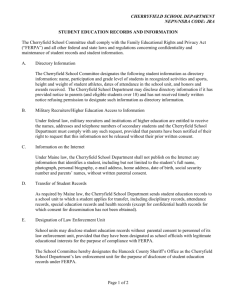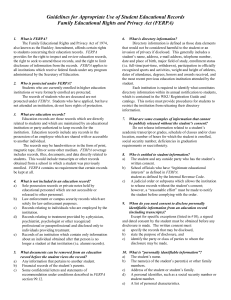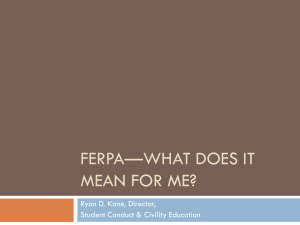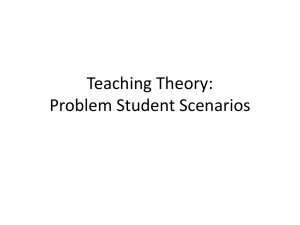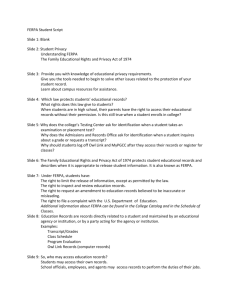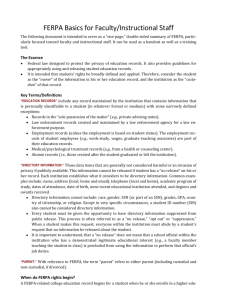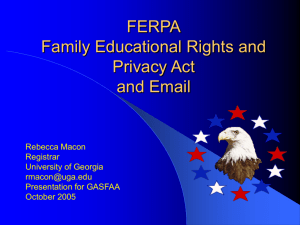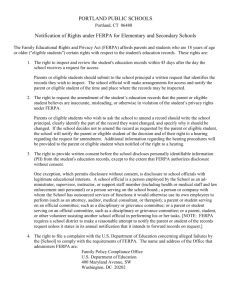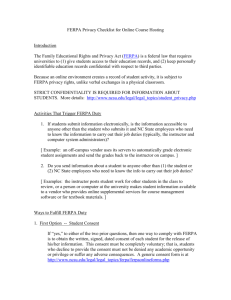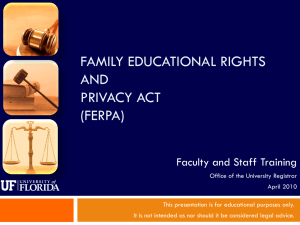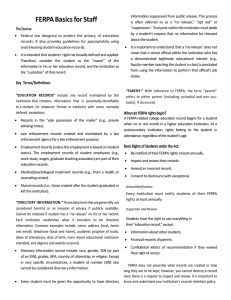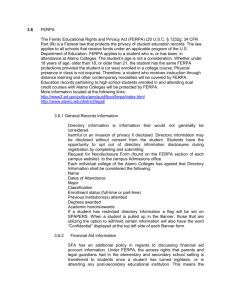FERPA Summary - Central Connecticut State University
advertisement
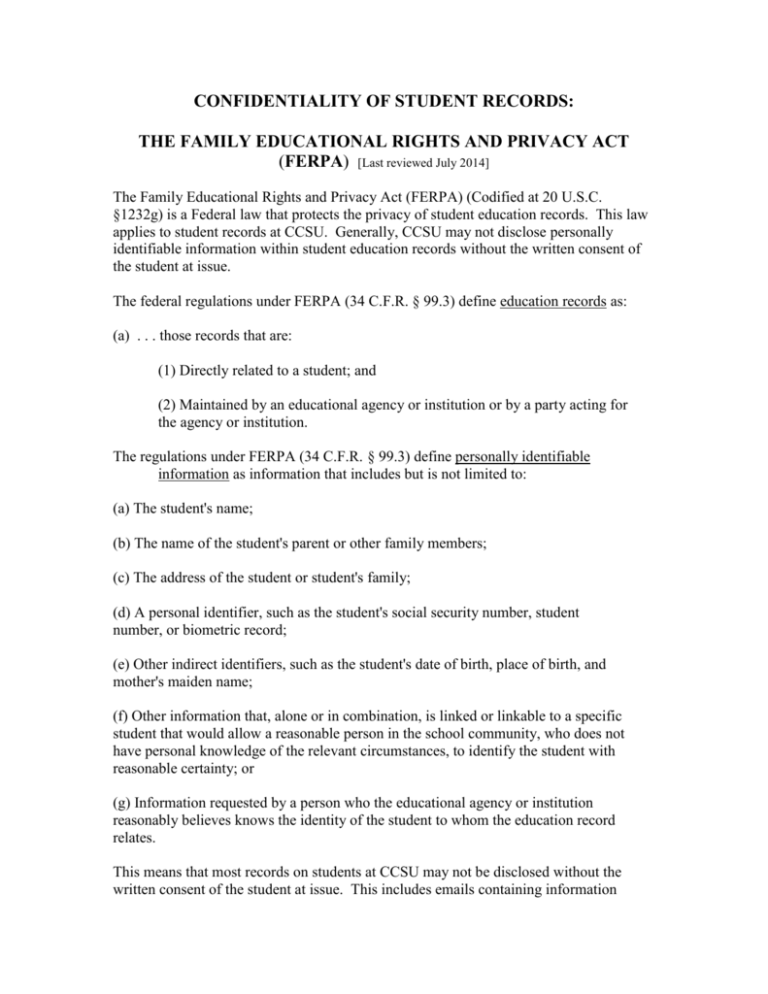
CONFIDENTIALITY OF STUDENT RECORDS: THE FAMILY EDUCATIONAL RIGHTS AND PRIVACY ACT (FERPA) [Last reviewed July 2014] The Family Educational Rights and Privacy Act (FERPA) (Codified at 20 U.S.C. §1232g) is a Federal law that protects the privacy of student education records. This law applies to student records at CCSU. Generally, CCSU may not disclose personally identifiable information within student education records without the written consent of the student at issue. The federal regulations under FERPA (34 C.F.R. § 99.3) define education records as: (a) . . . those records that are: (1) Directly related to a student; and (2) Maintained by an educational agency or institution or by a party acting for the agency or institution. The regulations under FERPA (34 C.F.R. § 99.3) define personally identifiable information as information that includes but is not limited to: (a) The student's name; (b) The name of the student's parent or other family members; (c) The address of the student or student's family; (d) A personal identifier, such as the student's social security number, student number, or biometric record; (e) Other indirect identifiers, such as the student's date of birth, place of birth, and mother's maiden name; (f) Other information that, alone or in combination, is linked or linkable to a specific student that would allow a reasonable person in the school community, who does not have personal knowledge of the relevant circumstances, to identify the student with reasonable certainty; or (g) Information requested by a person who the educational agency or institution reasonably believes knows the identity of the student to whom the education record relates. This means that most records on students at CCSU may not be disclosed without the written consent of the student at issue. This includes emails containing information about a student – if that information would permit one to personally identify the student. A sample FERPA consent form is attached to this handout. Please note, however, that the regulations under FERPA (34 C.F.R. § 99.3) provide that education records do not include: (b) (1) Records that are kept in the sole possession of the maker, are used only as a personal memory aid, and are not accessible or revealed to any other person except a temporary substitute for the maker of the record. (2) Records of the law enforcement unit of an educational agency or institution, subject to the provisions of § 99.8. (3)(i) Records relating to an individual who is employed by an educational agency or institution, that: (A) Are made and maintained in the normal course of business; (B) Relate exclusively to the individual in that individual's capacity as an employee; and (C) Are not available for use for any other purpose. (ii) Records relating to an individual in attendance at the agency or institution who is employed as a result of his or her status as a student are education records and not excepted under paragraph (b)(3)(i) of this definition. (4) Records on a student who is 18 years of age or older, or is attending an institution of postsecondary education, that are: (i) Made or maintained by a physician, psychiatrist, psychologist, or other recognized professional or paraprofessional acting in his or her professional capacity or assisting in a paraprofessional capacity; (ii) Made, maintained, or used only in connection with treatment of the student; and (iii) Disclosed only to individuals providing the treatment. For the purpose of this definition, "treatment" does not include remedial educational activities or activities that are part of the program of instruction at the agency or institution; and (5) Records created or received by an educational agency or institution after an individual is no longer a student in attendance and that are not directly related to the individual’s attendance as a student. (6) Grades on peer-graded papers before they are collected and recorded by a professor. Additionally, as with most laws, there are exceptions under FERPA when written consent is not required for disclosure. 20 U.S.C. 1232g (a)(5)(A). One of those exceptions is when CCSU has designated the student information as “directory information.” CCSU has designated the following information as directory information: student’s name, address, phone number, dates of attendance, class standing, photographs, academic major, minor and concentration, degree candidacy, degree(s) earned, award(s) received, participation in officially recognized activities and sports, weight and height of members of athletic teams and awards received. Note, however, that currently enrolled students have the right to request that CCSU not release directory information. Such requests must be made to the Office of the Registrar. Before responding to a request for directory information on a student, please make sure that the student has not made a request to the Office of the Registrar that this information be kept confidential. Perhaps even more importantly, FERPA permits the disclosure of student education records without consent to a university official with a legitimate educational interest in those records. 20 U.S.C. 1232g (b)(1)(A). At CCSU, we define a legitimate educational interest as needing to review an education record in order to fulfill one’s professional responsibilities. Please direct routine questions concerning FERPA to your department chairs. Should, however, you receive a subpoena seeking student education records, please contact my office immediately. CONSENT FOR DISCLOSURE OF EDUCATION RECORDS I, _______________________________, authorize Central Connecticut State University, (name of student) to release the following records: (Give detailed description of records to be disclosed) To the following individuals or organizations: (Identify by name and address or class of parties to whom disclosure may be made) Disclosure is authorized for the following purpose(s): __________________________________ Student Signature __________________________________ Date
